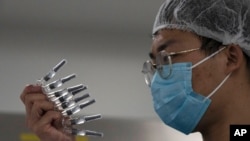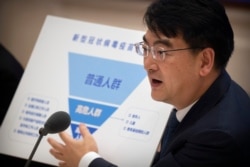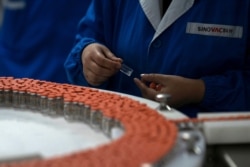China said on Friday that it had joined a global COVID-19 vaccine distribution plan backed by the World Health Organization, becoming the biggest economy to date to pledge support to distribute the shots fairly.
Meanwhile, the country is holding separate talks with the WHO to have its COVID-19 vaccines assessed, a step toward making them available for international use.
Public health experts welcome the Chinese move, yet caution potential safety concerns.
They are calling on China to publish all its clinical trial data to ensure transparency and gain public trust, saying rushing out a vaccine without adequate efficacy and safety testing is a recipe for disaster.
Clinical trial data
Socorro Escalate, WHO's coordinator for essential medicines and health technologies in the Western Pacific region, indicated this week that China had held preliminary discussions with the organization to have its vaccines included in a list for emergency use.
Beijing currently has at least four experimental vaccines in the final stage of clinical trials. The country has been giving hundreds of thousands of essential workers considered at high risk these experimental vaccines before the conclusion of phase III trials.
Dr. Amesh Adalja, a senior scholar at Johns Hopkins Center for Health Security, told VOA that it’s important for the WHO to evaluate the Chinese vaccines, yet also called on China to publish its data to ensure transparency.
“It is also important that we see the data from the clinical trials and the vaccinations that are already taking place. The world is going to need a lot of vaccines, and if China has developed a safe and effective vaccine, it’s a good thing. We just need to see the data,” he said.
One of the vaccines currently in the final stage of a clinical trial is Ad5-nCoV. Produced by Chinese pharmaceutical company CanSino Biologics, the vaccine has been tested among Chinese military members. Beijing said it had obtained data supporting the vaccine’s safety and effectiveness. But since China hasn’t published that data, international infectious disease experts cannot verify its claim.
“This is why it is essential that the Chinese companies release their trial data as well as the data from their experience vaccinating people in the military so that we can all understand how safe and efficacious this vaccine may be,” Adalja told VOA.
Dr. Laura Kahn, a scholar at Princeton University’s Program on Science and Global Security, agrees.
“Rushing out a vaccine without adequate efficacy and safety testing is a recipe for disaster,” she told VOA, “The public must trust a vaccine in order to be willing to get themselves or their loved ones vaccinated,” she said.
When scientists raced to develop a polio vaccine in the 1950s before adequate testing, the result was some 40,000 inoculated children contracting the disease from the vaccine, according to Kahn.
"In an era of public mistrust, a vaccine rush job is not the way to go. For the time being, until a vaccine is fully tested, wearing a mask is the way to go," she continued.
Joining COVAX
On Friday, China joins some 168 countries that have already announced their participation in COVAX, including 76 wealthy, self-financing ones. Neither the United States nor Russia has joined the program.
Yet Beijing did not give details on the level of support it will provide to the initiative co-led by the GAVI vaccines alliance, the WHO, and the Coalition for Epidemic Preparedness Innovations (CEPI).
The COVAX initiative aims to deliver at least two billion doses of vaccines by the end of 2021. It is designed to discourage national governments from hoarding COVID-19 vaccines and focusing on first vaccinating the most high-risk people in every country.
Chinese foreign ministry spokeswoman Hua Chunying said in a statement Friday that China has ample Covid-19 vaccine manufacturing capabilities and will prioritize supplying developing countries when vaccines are ready.






